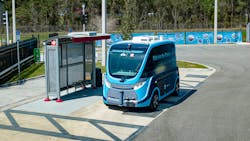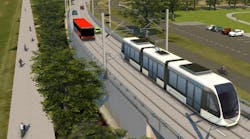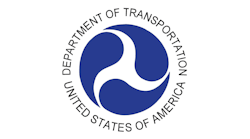USDOT awards more than $175 million in RAISE grants to transit and passenger rail projects
The U.S. Department of Transportation (USDOT) released a full list of awarded grants through the Rebuilding American Infrastructure with Sustainability and Equity (RAISE) discretionary grants program. Transit and passenger rail projects were awarded more than $175 million of the nearly $1 billion made available in this round of grants.
Transit projects will benefit from nearly $169 million in capital RAISE grants and $6.83 million in planning RAISE grants. Additionally, capital and planning projects with transit-related elements have been awarded an additional $218 million in grants. These projects have been awarded under non-transit modes but include transit elements such as stop improvements and access enhancements or improvements.
“We’re proud to support these great projects that will improve infrastructure, strengthen supply chains, make us safer, advance equity and combat climate change,” said U.S. Transportation Secretary Pete Buttigieg. “As in past years, we received far more applications than we could fund: this cycle saw about a ten-to-one ratio of requests to available dollars. But going forward, with the passage of President Biden’s Bipartisan Infrastructure Law, we will be able to support far more infrastructure projects to support jobs and everyday life in communities across the country."
The program selection criteria encompassed safety, environmental sustainability, quality of life, economic competitiveness, state of good repair, innovation and partnerships with a broad range of stakeholders. USDOT explains the grants also reflect its priorities “for creating good-paying jobs, improving safety, applying transformative technology and explicitly addressing climate change and advancing racial equity.”
The RAISE grants were to be equally awarded between urban and rural areas with no state being awarded more than $100 million and no project being awarded more than $25 million.
The only transit grant to come close to that threshold was the $24.25 million grant awarded to the city of Johnstown, Penn., for the Iron-to-Arts Corridor Project. The nearly $37-million project will restore and enhance the Johnstown Train Station, upgrade the CamTran Downtown Transit Center, rehabilitate and restore the Inclined Plane and connect the three transit hums via a complete street project. The project will restore full operations and connectivity within one of the poorest cities in the state.
Maryland Department of Transportation – Maryland Transit Administration was awarded a $22-million grant for the Baltimore East-West Priority Corridor Project, which will add dedicated bus lanes, transit signal priority, ADA improvements, bus stop enhancements and bicycle infrastructure along a 20-mile corridor in Baltimore City and Baltimore County.
Within the planning grants, the Jacksonville Transportation Authority was awarded $1.73 million for the Ultimate Urban Circulator: Neighborhood Extension and Planning Project. The grant will advance the planning, environmental review and permitting and preliminary project development activities for four Urban Circulator routes in Jacksonville, Fla.
A full list of the RAISE capital grant awards and the RAISE planning grant awards can be found on USDOT’s website.
The RAISE grants were known as Better Utilizing Investments to Leverage Development (BUILD) under the Trump Administration and Transportation Investment Generating Economic Recovery (TIGER) under the Obama Administration.
Transit RAISE Grants – Capital Awards:
Transit and passenger rail related awards appear in italics
City of Johnstown, Penn., Iron-to-Arts Corridor Project; $24.25 million
California High-Speed Rail Authority; Wasco SR 46 Improvement Project; $24 million
MDOT – Maryland Transit Administration; Baltimore East-West Priority Corridor Project; $22 million
City of Jackson, Miss.; Rebuilding Medgar Evers Boulevard; $20 million (transit stops)
City of Eugene, Ore.; Franklin Boulevard: A Partnership to Rebuild and Revive a Corridor; $19 million (BRT addition)
New Orleans Regional Transit Authority; New Links Implementation: Fare Modernization, Neighborhood Transfer Points, Regional Transfer Hubs and Operator Comfort Stations; $18.5 million
St. Louis County, Mo.; West Florissant Avenue Great Streets; $18.27 million (transit stops)
San Francisco County Transportation Authority; Yerba Buena Island West Side Bridges Seismic Retrofit Project; $18 million (transit-only access ramp)
Florida Department of Transportation; Tampa Heights Mobility Corridor; $18 million (creates exclusive transit lane)
Northwestern Indiana Regional Planning Commission; Completing the Vision – the Marquette Greenway; $17.8 million (expand access to existing transit)
City of Boston; Blue Hill Ave Multimodal Corridor Project; $15 million
City of Charlotte, N.C.; Charlotte Multimodal Transit Hub; $15 million
Southeastern Pennsylvania Transportation Authority; 19th & 37th Street Trolley Station Improvements; $15 million
New York Metropolitan Transportation Authority; ADA Accessibility and Circulation Improvements at Broadway Junction Complex; $15 million
City of Clinton, Iowa; Drive to Propriety: Manufacturing Drive and Bluff Boulevard Reconstruction; $15 million (transit shelter installation)
City of Denver, Colo.; Washington Street Livability Project; $13.99 million (improved transit access)
City of Springfield, Ill.; Springfield Rail Improvements Projects; $13.5 million (intercity rail improvements)
Connecticut DOT; Derby-Shelton Multimodal Transportation Center; $12.6 million
City of New Rochelle, N.Y.; The LINC: Safety, Mobility & Economic Opportunity; $11.96 million (multi-modal options; TOD)
City of Yuma, Ariz.; Yuma Multi-Modal Transportation Center; $10.6 million
City of Atlantic City, N.J.; Atlantic City Corridor Revitalization & Safety Project; $10.35 million (accessibility to transit stops)
Michigan DOT; Detroit New Center Intermodal Facility Project; $10 million
Carson City, Nev.; East William Street Complete Streets Project; $9.3 million (transit connections)
North Central Texas Council of Governments; Enhancing Mobility within the Southern Dallas Inland Port; $8.2 million
City of Palatka, Fla.; A. Philip Randolph Regional Multimodal Transportation Hub and Complete Streets Connectivity; $8.2 million (passenger rail; improved multimodal connectivity)
City of Trinidad, Colo., Southwest Chief La Junta Route Restoration Program; $2.8 million
RAISE Planning Awards:
Transit related awards appear in italics
Jacksonville Transportation Authority; Ultimate Urban Circulator; $1.73 million
Transit Authority of the City of Omaha; 24th Street Transit Corridor Study; $1.6 million
Utah Transit Authority; TechLink Corridor Study; $950,000
Rhode Island Public Transit Authority; Metro Providence High-Capacity Transit Corridor Feasibility and Alternatives Analysis; $900,000
City of Missoula, Mont.; Brooks Street BRT/TOD Planning Study; $847,000
Central Oklahoma Transportation and Parking Authority; Central Oklahoma Regional Transit Corridors to Promote Economic Development and Equity Inclusion; $800,000
Orlando CROSS; Connecting Residents on Safety Streets, City of Orlando, $606,000
-----
Source: USDOT

Mischa Wanek-Libman | Group Editorial Director
Mischa Wanek-Libman is director of communications with Transdev North America. She has more than 20 years of experience working in the transportation industry covering construction projects, engineering challenges, transit and rail operations and best practices.
Wanek-Libman has held top editorial positions at freight rail and public transportation business-to-business publications including as editor-in-chief and editorial director of Mass Transit from 2018-2024. She has been recognized for editorial excellence through her individual work, as well as for collaborative content.
She is an active member of the American Public Transportation Association's Marketing and Communications Committee and served 14 years as a Board Observer on the National Railroad Construction and Maintenance Association (NRC) Board of Directors.
She is a graduate of Drake University in Des Moines, Iowa, where she earned a Bachelor of Arts degree in Journalism and Mass Communication.




